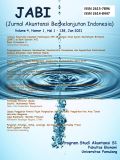Influence of Ethical Culture, Locus of Control, and Money Ethics on Ethical Perceptions of Tax Evasion
DOI:
https://doi.org/10.32493/JABI.v1i1.y2022.p45-58Keywords:
the Ethical Perception of Tax Evasion, Ethical Culture, Locus of Control, Money EthicsAbstract
This study aims to prove the ethical culture, locus of control, and money ethics on the ethical perception of tax evasion. The independent variables used in this study are ethical culture, locus of control, and money ethics, while the dependent variable is the ethical perception of tax evasion. This research was conducted at Pamulang University. The research method used is descriptive quantitative. The type of data used is primary data in a questionnaire distributed to Pamulang University Accounting Students online using a google form. Samples were collected by the accidental sampling method (convenience sampling). Respondents used for this study sample were 125 people with specific criteria to obtain 100 samples. Data processing using SPSS version 25.0 for windows by collecting data and related data is then calculated ethical culture, locus of control, and money ethics through testing using multiple linear regression analysis methods. This study indicates that partial ethical culture does not affect ethical perceptions of tax, locus of control affects the ethical perception of tax evasion, and money ethics has no effect on tax evasion. At the same time, the test results show that ethical culture, locus of control, and money ethics affect the ethical perception of tax evasion
References
Asih, N. P. S. M., & Dwiyanti, K. T. (2019). Pengaruh Love Of Money, Machiavellian, dan Equity Sensitivity Terhadap Persepsi Etika Penggelapan Pajak (Tax Evasion). E-Jurnal Akuntansi Universitas Udayana, 26(2), 1412–1435. https://doi.org/10.24843/eja.2019.v26.i02.p21
Basri, Y. M. (2015). Pengaruh gender, religiusitas dan sikap love of money pada persepsi etika penggelapan pajak mahasiswa akuntansi. Jurnal Ilmiah Akuntansi dan Bisnis, 10(1), 45-54.
Dewanta, M. A., & Machmuddah, Z. (2019). Gender, religiosity, love of money, and ethical perception of tax evasion. Jurnal Dinamika Akuntansi dan Bisnis, 6(1), 71-84.
Dwitia, E., Masripah, M., & Widiastuti, N. P. E. (2020). Taxpayer Perception Related To Love Of Money, Machiavellian, And Equity Sensitivity On Tax Evasion Ethics. Jurnal Akuntansi dan Perpajakan Jayakarta, 2(1), 18-33.
Halim, A., Bawono, I. R., & Dara, A. (2020). Perpajakan: Konsep, Aplikasi, Contoh, dan Studi Kasus (3rd ed.). Penerbit Salemba Empat.
Irawati, W., Akbar, Z., Wulandari, R., & Barli, H. (2020). Analisis Profitabilitas, Leverage, Pertumbuhan Penjualan Dan Kepemilikan Keluarga Terhadap Penghindaran Pajak. JAK (Jurnal Akuntansi) Kajian Ilmiah Akuntansi, 7(2), 190-199.
Isgiyarta, J. (2019). The Effect of Gender, Locus of Control, Love of Money, and Economic Status on Students' Ethical Perception. International Journal of Higher Education, 8(5).
Kurniawan, P. I., & Widanaputra, A. A. G. . (2017). Pengaruh Love of Money dan Machiavellian Terhadap Persepsi Etis Mahasiswa Akuntansi. E-Jurnal Akuntansi Universitas Udayana, 21(3), 2253–2281. https://doi.org/10.24843/EJA.2017.v21.i03.p20
Li-Ping Tang, T., Akande, A., Alzubaidi, A. S., Borg, M. G., Cheng, B.-S., Chiu, R. K., … Vlerick, P. (2002). Is "The Love of Money" The Root of All Evil? or Different Strokes for Different Folks: Lesson in 12 Countries. BRC Papers on Cross-Cultural Management.
Mardiasmo. (2018). Perpajakan (Maya, ed.). Andi Yogyakarta.
Martina, M. B., Werastuti, D. M., & Jurusan, E. S. (2015). Pengaruh Budaya Etis Organisasi, Orientasi Etika, Pengalaman, dan Profesionalisme Terhaddap Sensitivitas Etika Kegiatan Audit yang Dilaksanakan Inspektorat Pemerintah Kabupaten Buleleng. E-Journal S1 Ak Universitas Pendidikan Ganesha, 3(1).
Muslim, M. (2017). Urgensi Etika Bisnis di Era Global. ESENSI, 20(2), 148–158.
Oktaviani, R. M., Srimindarti, C., & Hardiningsih, P. (2018). Peran religionsity sebagai pemoderasi hubungan money ethics terhadap upaya tax evasion. Jurnal Akuntansi, 22(1), 105-118.
Permana, R. A., & Oktavianna, R. (2022). Pengaruh Intensitas Aset Tetap, Komisaris Independen Dan Komite Audit Terhadap Tax Avoidance. Pro@ ksi, 1(1), 460-474.
Purnamasari, P., Sari, M., Sukartha, I., & Gayatri, G. (2021). Religiosity as a moderating variable on the effect of love of money, Machiavellian and equity sensitivity on the perception of tax evasion. Accounting, 7(3), 545-552.
Ramadhani, T. S. (2015). Pengaruh Sifat Machiavellian, Locus of Control, Dan Equity Sensitivity Terhadap Penghindaran Pajak Dengan Keputusan Etis Sebagai Variabel Intervening. Jom.FEKON, 2(2), 1–15.
Robbins, S. P., & Judge, T. A. (2013). Organizational Behavior (15th ed.). Pearson Education, Inc.
Suprayogi, T. T. (2017). Locus of Control dn Kinerja Karyawan: Uji Komparasi. Jurnal Riset Manajemen Dan Bisnis (JRMB) Fakultas Ekonomi UNIAT, 2(2), 131–138.
Yuhertina, I., Setyaningrum, R. M., Hastuti, S., & Sundari, S. (2016). Etika, Organisasi, dan Kepatuhan Wajib Pajak. Jurnal Akuntansi Multiparadigma, 7(1), 131–141. https://doi.org/10.18202/jamal.2016.04.7012
Yusra, M., & Utami, C. (2018). Pengaruh Love of Money dan Machiavellian Terhadap Persepsi Etis Mahasiswa Akuntansi (Studi Empiris pada Mahasiswa Prodi Akuntansi Universitas Malikussaleh). Jurnal Akuntansi Dan Keuangan, 6(1), 11–24.
Downloads
Published
Issue
Section
License
Authors who publish with this journal agree to the following terms:
- Authors retain copyright and grant the journal right of first publication with the work simultaneously licensed under a Creative Commons Attribution License that allows others to share the work with an acknowledgement of the work's authorship and initial publication in this journal.
- Authors are able to enter into separate, additional contractual arrangements for the non-exclusive distribution of the journal's published version of the work (e.g., post it to an institutional repository or publish it in a book), with an acknowledgement of its initial publication in this journal.
- Authors are permitted and encouraged to post their work online (e.g., in institutional repositories or on their website) prior to and during the submission process, as it can lead to productive exchanges, as well as earlier and greater citation of published work (See The Effect of Open Access)

This work is licensed under a Creative Commons Attribution-ShareAlike 4.0 International License.


 PUBLICATION ETHICS
PUBLICATION ETHICS FOCUS AND SCOPE
FOCUS AND SCOPE EDITORIAL TEAM
EDITORIAL TEAM REVIEW PROCESS
REVIEW PROCESS CONTACT US
CONTACT US AUTHOR GUIDELINES
AUTHOR GUIDELINES




